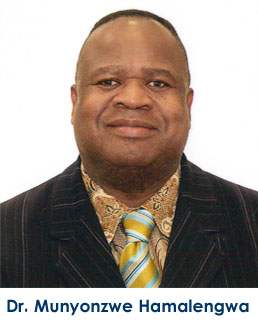A Critical Examination of Racial Profiling in Canada:
A Constitutional Law Context
|
He is a prolific writer and has done considerable work in the area of systemic racism, through his writing and his legal advocacy'... The Honorable Sidney B. Linden Commissioner for the Ipperwash Inquiry, May 7, 2004.
Born in Zambia, a landlocked Country in South Central Africa, he is the second of four siblings. Munyonzwe Hamalengwa - in Tonga, his mother's tongue, translates into English as 'Sweet Trouble' spent his childhood in the agrarian town of Monze, that lies 2.5 hrs from Lusaka the Capital. His matchless individuality is informed by wealthy experiences brought about from the early days when he played with his friends, on red sandy yards of Monze, creating ingenuous toys as well as providing care to his younger siblings while his mother and father planted the nearby farm-land to provide the family with nutritious basic staples. The teenage stubborn years that followed, full of teen rivalry and rebellion were replaced by years of youthful idealism at the University of Zambia in Lusaka. In 1976 Munyonzwe was detained with other student leaders in solitary confinement following demonstrations against the Zambian government's handling of issues related to Angola' s Independence 1 and issues of freedom of speech and expression. Six months later he was released and threatened with banishment to the countryside. He then fled to neighboring Tanzania and from there came to Canada in 1977. In Toronto, he studied at York University (1977-79) and later went to the Norman Paterson School of International Affairs at Carleton University (1979-80), Antioch School of Law in Washington DC(1982-83) and then Osgoode Hall Law School (1986-89). He obtained an LLM in 2001 and a PhD in Law in 2013. He articled for Ruby and Edwardh, Barristers and solicitors (1989-1990). Dr. Hamalengwa paracticed Administrative Law, Human Rights Law , Immigration Law, Criminal Law, Constitutional law, Family law all at both trial and appeal levels and International Law of Human Rights . His zeal for law and justice are influenced by terrible circumstances he endured in his shaping years. His vigorous representation has no subordination to any other interests - ideological, career, personal - but the legitimate interests of the client 2 . Dr. Hamalengwa has defended all types of cases including murder, arson, drugs, fraud and others. He has also brought novel constitutional challenges that were not popular in Canada at the time including racial profiling in the immigration and criminal law context 3 . His first constitutional case on racial profiling was brought in 1993 ( Ritchie et al v.Her Majesty ) in Superior Court of Justice. He then did immigration cases on racial profiling one of which went all the way to the Supreme Court of Canada (Moffatt). Dr. Hamalengwa has also battled his own cases in court and the Law Society of Upper Canada on racial profiling. He is also an active member of the Toronto community , founding many organizations like Forum For African Students in Toronto (FAST)(1980); African Human Rights Research Association (1982 in Strasbourg, France); York Student Movement Against Apartheid; Development And Underdevelopment Series; Nelson Mandela Law Society (1986); Lawyers Against Apartheid (1989) and others. He has served on the Liquor Licence Board Of Ontario between 1991 and 1994 and the Board of Inquiry under the Human Rights Code between 1995 and 1998. His passion for politics and activism made him run for Mayor of Toronto in 1997. During the many intervening years, Hamalengwa has written a legal/ criminal /immigration/political column, which appeared weekly Pride (Toronto, ON., Canada) and African Affairs (Montreal, QC, Canada), Contrast Newspaper (Toronto, On., Canada) and Diversity (Toronto, ON., Canada). His articles have also appeared in various magazines such as For the Defence , Law Times , Lawyers Weekly and newspapers such as Globe and Mail , Toronto Star , National Post , The Post (Zambia) and others some of the articles appear on the Zambian website. He has published so far four major books and others are still in progress. He worked in Washington, DC for a human rights organization and has traveled to Australia, Brazil, Japan, China, Europe, Hong Kong, Nigeria, Cuba, South Africa and other parts of the world on human rights causes and the reform of criminal law. Dr. Hamalengwa picks his heroes carefully4: for many years he worshipped heroes like Nelson Mandela, Thurgood Marshall, Gitobu Imanyara of Kenya, Paul Robeson, Mahatma Gandhi, Johnnie L. Cochran and other legal giants and social advocates. His passion and admiration for Nelson Mandela 5 lead him to form the Nelson Mandela Law Society in 1986 at Osgoode Hall Law School 6 named after his hero, he also championed the idea of bestowing an award of recognition to Nelson Mandela the Honorary Doctorate of Laws, York University, Toronto, Canada on 16 June 1989 (this was the first Canadian University to do so) and later the formation of Nelson Mande la Academy of Applied Legal Studies in 1996, an institution that reflects his passion for legal education and legal advocacy. This school trains paralegals for self-employment, a much needed role in the visible minority community in Toronto in order to take legal education to people at the grass-roots level 7. Dr. Hamalengwa also marks his presence in the Community by sponsoring many African events among a few are the African Canadian Achievement Awards where for many years he sponsored the law award which recognizes the contributions of lawyers, judges and organizations to the better administration of justice in the community and MissAfriCanada 2004.
|



